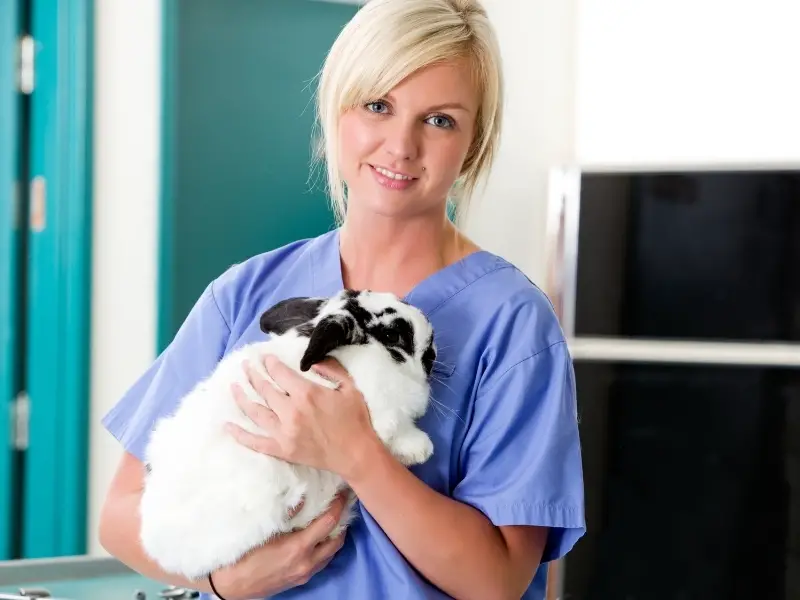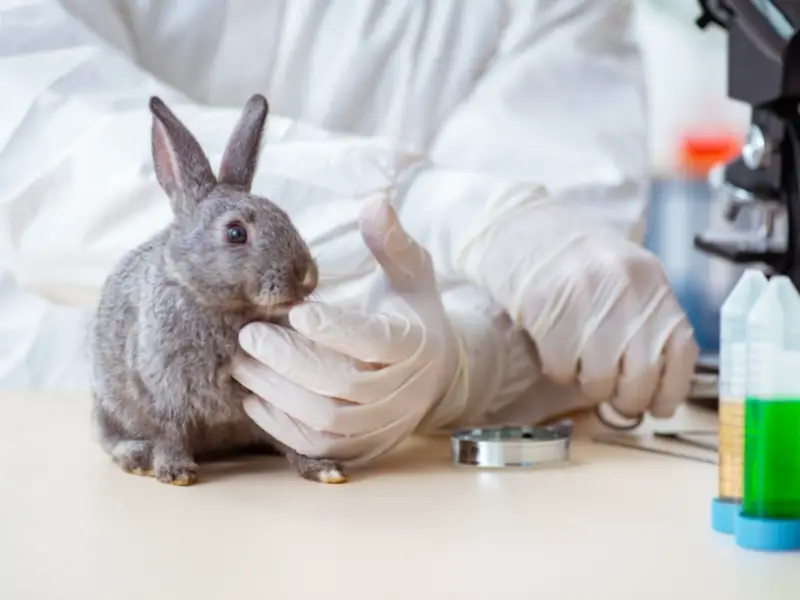Besides preventing unwanted pregnancies, there are many other benefits of spaying or neutering your pet rabbit. But before you book the procedure you should know what to expect in terms of the cost.
So, how much does it cost to neuter a rabbit? The average cost to spay or neuter your rabbit is around $250. However, if you live in a major metropolitan area expect to pay up to $500 to spay or neuter your rabbits. The low-cost spay/neuter programs are much cheaper and on average cost between $100 and $150.
Now that you know how much it costs to spay and neuter rabbits we’ll tell you everything else you need to know about getting your bunny fixed. Keep on reading to find out if it is safe to spay or neuter a rabbit and at what age should rabbits be altered.
Should Rabbits Be Neutered?
If you don’t plan on breeding your rabbits for meat or profit, you should definitely spay or neuter them. Spaying and neutering pet rabbits is an important aspect of rabbit ownership and are no different than fixing a dog or a cat.
Besides being a humane and responsible thing to do, fixing your pet rabbit also offers behavioral and health benefits.
If you are still unsure whether or not neutering is the right choice, the following benefits of this procedure will change your mind!
1. Altered Rabbits Live Longer
According to House Rabbit Society, altered rabbits are healthier and live longer than their unaltered counterparts (source).
The risk of ovarian, mammillary, and uterine cancers is completely eliminated by spaying a female rabbit. While the chances of a male rabbit getting testicular cancer aren’t as high, older unneutered male rabbits are at a higher risk of getting ill.
Furthermore, an altered male rabbit will live longer than an unneutered male since it won’t have a strong urge to fight with other animals due to its sexual aggression.
2. Altered Rabbits Make Better Pets
Altered pet rabbits make better companions once their insatiable urge to mate has been removed. Like all other animals, fixed rabbits are much calmer, loving, cuddly, and less prone to a destructive and aggressive behavior after the surgery.
3. Neutered Rabbits Are Easier to Train
Like unneutered male cats, unneutered male rabbits spray to mark their territory and can be hard to litter train once they reach sexual maturity. But once a rabbit is altered they are much easier to litter train and are more reliable when it comes to using the litter box.
4. Altered Rabbits Don’t Contribute to Overpopulation
By spaying and neutering your pet rabbit you aren’t contributing to the overpopulation of rabbits. Thousands of unwanted rabbits end up in animal shelters, but many more are abandoned on streets, parks, and forests to fend for themselves (source).
And if you thought that pet store rabbits are luckier, you’re in for a rude awakening. These rabbits often don’t have a much better fate because no one checks what kind of home they will go to and whether they will end up on the street in a month’s time.
Is It Safe to Spay or Neuter a Rabbit?

A spaying or neutering surgery can be as safely done on a rabbit as on any other animal. However, the vast majority of veterinarians aren’t very experienced in treating and operating on small animals such as rabbits.
If a veterinarian doesn’t have extensive experience with rabbits don’t allow them to do your bunny’s spay or neuter surgery. Finding a veterinarian that is trained to work on rabbits is key, and will ensure that your pet will receive proper care and treatment.
Using isoflurane as an anesthetic is the best practice for rabbits because it won’t make them groggy or affect their appetite afterward. As long as your vet has experience doing rabbit surgery and performs the neutering by the book, there is little to worry about.
What Age Should I Neuter My Rabbit?
Rabbits are usually altered when they are around four or five months old. Female rabbits can be spayed as soon as they reach sexual maturity, usually around four months old.
However, most veterinarians prefer to wait until they are six months old, since the surgery if done too early, can affect the bone density of female rabbits.
Male rabbits, on the other hand, can be neutered as soon as their testicles are fully descended, usually around three and a half months.
Bear in mind that male rabbits can remain fertile up to four weeks after the surgery, as some sperm can remain in the genital tract. To prevent unwanted pregnancies, keep your male rabbit separated from unneutered female rabbits at least a month after the surgery.
What Should You Consider When You Neuter Your Rabbit?
When it comes to spaying or neutering your pet rabbit, the age of your bunny is an important thing to consider. Whether you knew it or not, a rabbit can be too old to be spayed or neutered so first make sure that it’s safe for your pet to get the surgery.
Every veterinarian will have a personal stand on this, but the majority agrees that after a rabbit is six years old, the surgery and anesthetics become too risky.
If your rabbit is over two years old, it’s always a good idea to have full blood work and a thorough examination done before the surgery. While this will add to the overall cost of the surgery, you’ll sleep better knowing that your bunny is going under without any undiagnosed health issues.
Conclusion
Like all other pet parents, rabbit owners have the obligation to spay or neuter their pet rabbits when the time comes. Depending on where you live and the overall health of your rabbit, you may end up paying more than the average price for surgery.
Spaying and neutering procedures are the most expensive in metropolitan areas, so you might want to check if there is a low-cost neuter program in your area.
Contact your local House Rabbit Society for more information, and a recommendation for an experienced vet who can do the surgery and treat your rabbit in the future, when necessary.
Related Articles:

